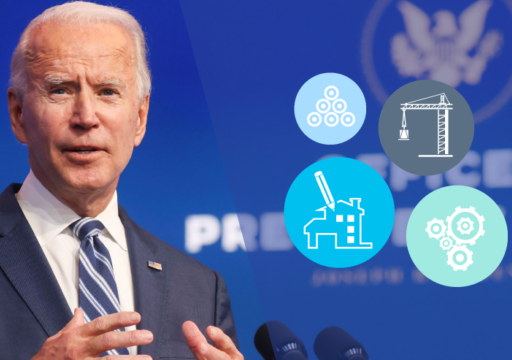
On February 4, 2022, President Joe Biden signed an executive order requiring project labor agreements on federal construction projects valued over $35 million in a move that the White House says will strengthen workers and unions and speed up construction times across the country.
According to the White House statement, as of January 30, federal contractors in new or extended contracts must pay a $15/hour minimum wage.
The order went into effect as soon as it was signed, and the White House says that the move could impact nearly 200,000 workers taking part in $262 billion in federal construction contracts.
Project labor agreements (PLAs) are collective bargaining agreements between building trade unions and contractors which govern terms and conditions of employment for all craft workers on a construction project — which includes both union and non-union workers.
Project Labor Agreements (PLAs): What Contractors Need to Know
This is a measure that has some significant support from unions nationwide; the AFL-CIO says that such agreements protect taxpayers and keep projects moving along by “eliminating costly delays due to labor conflicts or shortages of skilled workers.”
Additionally, the order directs the US departments of Defense and Labor to lead training for their contracting workforces — with the number of employees nearing 40,000 — in the implementation of the policy.
“By requiring the use of project labor agreements on federal construction projects above $35 million, the Order will help alleviate the management and coordination challenges that can stymie progress on major construction projects,” said the White House in a statement on the executive order. “This helps projects get completed on time and helps the government get the best value for taxpayers’ dollars.”
Though the order applies mainly to federal construction projects, it could potentially impact private projects, as well, as it can cover any construction project that receives some form of federal assistance (including loans or tax credits).
As the National Law Review notes, the executive order has some exceptions: A PLA won’t be mandated if doing so would substantially reduce potential bidders on a project or would result in some sort of project inefficiency, such as holding back a project involving specialized construction work.
The order follows the Biden administration’s focus on infrastructure and construction in the country, including the passage of an over $1 trillion infrastructure bill.
The administration says it is using this opportunity to continue to strengthen this focus, an unsurprising choice given that union officials and labor experts nationwide consider Biden to be among the most pro-labor presidents.
The new measures outlined in this order “streamline the negotiation process and gives employers access to a highly skilled pool of craftworkers,” added Daniel Hogan, chief executive of the Association of Union Constructors (TUAC).
However, reaction to the order hasn’t been completely positive.
While organizations like TUAC and the National Electrical Contractors Association have broadcast support for the move, there’s been a strong amount of pushback from groups like the Associated General Contractors and National Utility Contractors Association.
“It is hard to explain why the President would choose to impose government mandated project labor agreements to solve a problem that doesn’t exist,” said Associated General Contractors CEO Stephen E. Sandherr.
“Construction workers are among some of the highest paid workers in the economy, earning 10 percent more than the average worker in the U.S,” he continued. “Their pay rates have continued to climb 5.1 percent as labor shortages have made this a workers’ market…Government-mandated project labor agreements undermine the collective bargaining process by imposing a separate agreement in a specific region that applies only to a limited number of construction firms and unions.”
“President Biden’s new policy will not help America ‘Build Back Better;’ instead, it will exacerbate the construction industry’s skilled workforce shortage, needlessly increase construction costs and reduce opportunities for local contractors and skilled tradespeople,” added Associated Builders and Contractors Vice President of Regulatory, Labor, and State Affairs Ben Brubeck. “This anti-competitive and costly executive order rewards well-connected special interests at the expense of hardworking taxpayers and small businesses who benefit from fair and open competition on taxpayer-funded construction projects.”

11 Ways President Biden Plans To Impact Construction